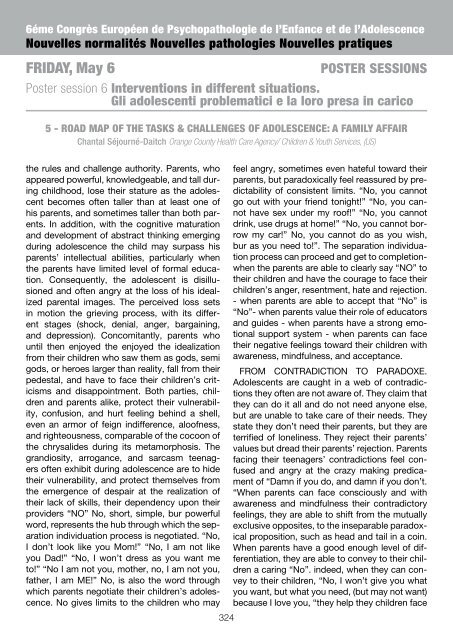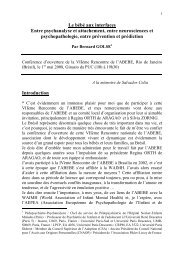Nouvelles normalités Nouvelles pathologies Nouvelles ... - Psynem
Nouvelles normalités Nouvelles pathologies Nouvelles ... - Psynem
Nouvelles normalités Nouvelles pathologies Nouvelles ... - Psynem
You also want an ePaper? Increase the reach of your titles
YUMPU automatically turns print PDFs into web optimized ePapers that Google loves.
6° 6éme Congresso Congrès Européen Europeo de di Psicopatologia Psychopathologie dell’Infanzia de l’Enfance e et dell’Adolescenza<br />
de l’Adolescence<br />
Nuove <strong>Nouvelles</strong> normalità <strong>normalités</strong> Nuove <strong>Nouvelles</strong> patologie <strong>pathologies</strong> Nuove pratiche <strong>Nouvelles</strong> pratiques<br />
FRIDAY, May 6 POSTER SESSIONS<br />
Poster session 6 Interventions in different situations.<br />
Gli adolescenti problematici e la loro presa in carico<br />
5 - ROAD MAP OF THE TASKS & CHALLENGES OF ADOLESCENCE: A FAMILY AFFAIR<br />
Chantal Séjourné-Daitch Orange County Health Care Agency/ Children & Youth Services, (US)<br />
the rules and challenge authority. Parents, who<br />
appeared powerful, knowledgeable, and tall during<br />
childhood, lose their stature as the adolescent<br />
becomes often taller than at least one of<br />
his parents, and sometimes taller than both parents.<br />
In addition, with the cognitive maturation<br />
and development of abstract thinking emerging<br />
during adolescence the child may surpass his<br />
parents’ intellectual abilities, particularly when<br />
the parents have limited level of formal education.<br />
Consequently, the adolescent is disillusioned<br />
and often angry at the loss of his idealized<br />
parental images. The perceived loss sets<br />
in motion the grieving process, with its different<br />
stages (shock, denial, anger, bargaining,<br />
and depression). Concomitantly, parents who<br />
until then enjoyed the enjoyed the idealization<br />
from their children who saw them as gods, semi<br />
gods, or heroes larger than reality, fall from their<br />
pedestal, and have to face their children’s criticisms<br />
and disappointment. Both parties, children<br />
and parents alike, protect their vulnerability,<br />
confusion, and hurt feeling behind a shell,<br />
even an armor of feign indifference, aloofness,<br />
and righteousness, comparable of the cocoon of<br />
the chrysalides during its metamorphosis. The<br />
grandiosity, arrogance, and sarcasm teenagers<br />
often exhibit during adolescence are to hide<br />
their vulnerability, and protect themselves from<br />
the emergence of despair at the realization of<br />
their lack of skills, their dependency upon their<br />
providers “NO” No, short, simple, bur powerful<br />
word, represents the hub through which the separation<br />
individuation process is negotiated. “No,<br />
I don’t look like you Mom!” “No, I am not like<br />
you Dad!” “No, I won’t dress as you want me<br />
to!” “No I am not you, mother, no, I am not you,<br />
father, I am ME!” No, is also the word through<br />
which parents negotiate their children’s adolescence.<br />
No gives limits to the children who may<br />
324<br />
feel angry, sometimes even hateful toward their<br />
parents, but paradoxically feel reassured by predictability<br />
of consistent limits. “No, you cannot<br />
go out with your friend tonight!” “No, you cannot<br />
have sex under my roof!” “No, you cannot<br />
drink, use drugs at home!” “No, you cannot borrow<br />
my car!” No, you cannot do as you wish,<br />
bur as you need to!”. The separation individuation<br />
process can proceed and get to completion-<br />
when the parents are able to clearly say “NO” to<br />
their children and have the courage to face their<br />
children’s anger, resentment, hate and rejection.<br />
- when parents are able to accept that “No” is<br />
“No”- when parents value their role of educators<br />
and guides - when parents have a strong emotional<br />
support system - when parents can face<br />
their negative feelings toward their children with<br />
awareness, mindfulness, and acceptance.<br />
FROM CONTRADICTION TO PARADOXE.<br />
Adolescents are caught in a web of contradictions<br />
they often are not aware of. They claim that<br />
they can do it all and do not need anyone else,<br />
but are unable to take care of their needs. They<br />
state they don’t need their parents, but they are<br />
terrified of loneliness. They reject their parents’<br />
values but dread their parents’ rejection. Parents<br />
facing their teenagers’ contradictions feel confused<br />
and angry at the crazy making predicament<br />
of “Damn if you do, and damn if you don’t.<br />
“When parents can face consciously and with<br />
awareness and mindfulness their contradictory<br />
feelings, they are able to shift from the mutually<br />
exclusive opposites, to the inseparable paradoxical<br />
proposition, such as head and tail in a coin.<br />
When parents have a good enough level of differentiation,<br />
they are able to convey to their children<br />
a caring “No”. indeed, when they can convey<br />
to their children, “No, I won’t give you what<br />
you want, but what you need, (but may not want)<br />
because I love you, “they help they children face



